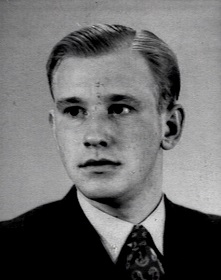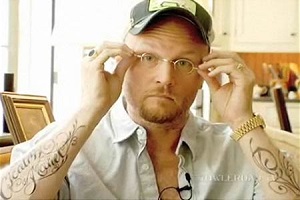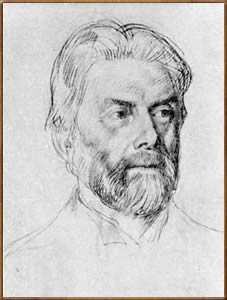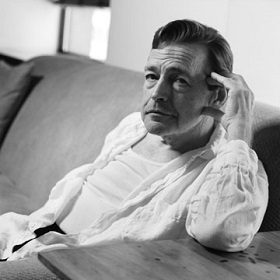De Nederlandse dichter en schrijver Michel van der Plas werd geboren op 23 oktober 1927 in Den Haag. Zie ook alle tags voor Michel van der Plas op dit blog.
1938
Ik wil je iets voorlezen uit Dik Trom.
Maar jij, over je avondblad gebogen,
slaat juist bezorgd een eigen bladzij om.
Je lijkt opeens veranderd; ingetogen.
Als ik met Flipse op de proppen kom,
zou dat goed fout zijn, zie ik aan je ogen.
Dus houd ik me, net zoals jij, maar stom.
Ik zie nog net Brand staan en Synagogen.
Er is een wereld waarin vaders zwijgen
en buigen voor een sterker, vreemd gezag,
en waar ik nog niet hoor. Er komt een dag
waar kranten lamp en kamer in bedreigen
en mensen buiten lange messen krijgen,
en waar een veldwachter niets meer vermag.
Vader
Vader, wat zou ik er voor willen geven
als je er af en toe nog eens kon zijn
en een zondag kwam zitten in mijn leven
bij mijn werk en mijn boeken en mijn wijn.
Soms zie ik nog mannen van vijfentachtig
(je weet wel waar) met een gezicht vol zon
en zin, en dan denk ik: godallemachtig
als ik hem zo nog eens meenemen kon.
Want op de een of de andere manier
leef ik toch ook nog steeds voor jou: jouw ogen
wil ik, met hun aandacht, pret en mededogen
bij mijn geploeter, mijn huis en mijn hier:
en ik zag ze zo graag een keer genieten
van al wat ze met tranen achterlieten.
Water
Ik ben zo graag bij mijn liefste. Zij kan
spelen als water, als een bergbeek die
naar mijn open handen klatert en dan
onvoorstelbaar veel meer wordt dan ik zie.
Zij is overal met haar watermond
en waterhanden; is overal waar;
zij slijpt de stenen van ons verdriet rond,
ja zij maakt ze zelfs mooi en van elkaar.
Ik had nooit geweten dat water brandt
of dat het als feestelijk vuur in mij
kan zuchten van lust, zo gretig en vrij.
Maar hoe, haar verblindende spel voorbij,
de beek uitstroomt, kan ik niet zeggen, want
dat weet niemand onder de zon, niemand

Michel van der Plas (23 oktober 1927 -21 juli 2013)
In 1952
De Albanees-Amerikaanse schrijfster en actrice Masiela Lusha werd geboren op 23 oktober 1985 in Tirana. Zie ook alle tags voor Masiela Lusha op dit blog.
Fruits of Tribute
When mores bind this flesh and spirit
Into one man of mortal pride and truth,
When two drops of tranquil waters
Fill his sight’s hollows with tranquil views.
When his lips spread wide and part,
Let this follow as white delight for me,
And when his fingers erect against my skin,
let me catch it for flying modesty.
When his vowels draw steady and right,
Please let these words be right…
Be right, and right with famed morals.
And let him speak, so I can hear
These trophy words of ‘love’
And ‘dear, ‘ And when he breathes,
Let me watch his clean puff of air
Raise the values of his speech.
When I meet his curtained eyes,
Allow me to find light, beneath
And underneath, or even through,
Just a slender gleam of this would do.
And when his mouth shapes into ‘you’
and ‘me’ and ‘us’… please let me note
For however brief, the sudden weight of Love
Unadorned, please unadorned, with powered silver lies.
And all his charm of touch and smiles be buried
In my hair, my eyes, my skin, beneath my spirit’s shifting sea
And let all the bidden fruits of this man’s tributes,
Please be truly plucked from the garden of me.

Masiela Lusha (Tirana, 23 oktober 1985)
De Amerikaanse schrijver Augusten Xon Burroughs werd geboren op 23 oktober 1965 in Pittsburgh, Pennsylvania. Zie ook alle tags voor Augusten Burroughs op dit blog.
Uit: Running with Scissor
“Okay, I see what’s the matter,” my mother says. She turns to me and smiles. “Augusten, hand me that box, would you?”
Her long, frosted beige nail points to the box of Kotex maxi pads on the floor next to the toilet bowl. I grab the box and hand it to her.
She takes two pads from the box and sets it on the floor at her feet. I notice that the box is reflected in the side of her shoe, like a small TV. Carefully, she peels the paper strip off the back of one of the pads and slides it through the neck of her dress, placing it on top of her left shoulder. She smoothes the silk over the pad and puts another one on the right side. She stands back.
“What do you think of that!” she says. She is delighted with herself. It’s as if she has drawn a picture and placed it on her own internal refrigerator door.
“Neat,” I say.
“You have a very creative mother,” she says. “Instant shoulder pads.”
The blow-dryer continues to tick like a clock, counting down the seconds. Hot things do that. Sometimes when my father or mother comes home, I will go down and stand near the hood of the car to listen to it tick, moving my face in close to feel the heat.
“Are you coming upstairs with me?” she says. She takes her cigarette from the clamshell ashtray on the back of the toilet. My mother loves frozen baked stuffed clams, and she saves the shells to use as ashtrays, stashing them around the house.
I am fixated on the dryer. The vent holes on the side have hairs stuck in them, small hairs and white lint. What is lint? How does it find hair dryers and navels? “I’m coming.”
“Turn off the light,” she says as she walks away, creating a small whoosh that smells sweet and chemical. It makes me sad because it’s the smell she makes when she’s leaving.
“Okay,” I say. The orange light from the dehumidifier that sits next to the wicker laundry hamper is looking at me, and I look back at it. Normally it would terrify me, but because my mother is here, it is okay. Except she is walking fast, has already walked halfway across the family room floor, is almost at the fireplace, will be turning around the corner and heading up the stairs and then I will be alone in the dark bathroom with the dehumidifier eye, so I run. I run after her, certain that something is following me, chasing me, just about to catch me. I run past my mother, running up the stairs, using my legs and my hands, charging ahead on all fours. I make it to the top and look down at her.”

Augusten Burroughs (Pittsburgh, 23 oktober 1965)
De Engelse dichter, toneel- en prozaschrijver Robert Seymour Bridges werd geboren in Walmer, Kent, op 23 oktober 1844. Zie ook alle tags voor Robert Bridges op dit blog.
In autumn moonlight, when the white air wan
In autumn moonlight, when the white air wan
Is fragrant in the wake of summer hence,
‘Tis sweet to sit entranced, and muse thereon
In melancholy and godlike indolence:
When the proud spirit, lull’d by mortal prime
To fond pretence of immortality,
Vieweth all moments from the birth of time,
All things whate’er have been or yet shall be.
And like the garden, where the year is spent,
The ruin of old life is full of yearning,
Mingling poetic rapture of lament
With flowers and sunshine of spring’s sure returning;
Only in visions of the white air wan
By godlike fancy seized and dwelt upon.
While yet we wait for spring, and from the dry
While yet we wait for spring, and from the dry
And blackening east that so embitters March,
Well-housed must watch grey fields and meadows parch,
And driven dust and withering snowflake fly;
Already in glimpses of the tarnish’d sky
The sun is warm and beckons to the larch,
And where the covert hazels interarch
Their tassell’d twigs, fair beds of primrose lie.
Beneath the crisp and wintry carpet hid
A million buds but stay their blossoming;
And trustful birds have built their nests amid
The shuddering boughs, and only wait to sing
Till one soft shower from the south shall bid,
And hither tempt the pilgrim steps of spring.

Robert Bridges (23 oktober 1844 – 21 april 1930)
Portret door W. Strang, National Portrait Gallery, London
De Oostenrijkse schrijver Adalbert Stifter werd geboren in Oberplan op 23 oktober 1805. Zie ook alle tags voor Adalbert Stifter dit blog.
Uit: Der Nachsommer
„Mein Vater war ein Kaufmann. Er bewohnte einen Teil des ersten Stockwerkes eines mäßig großen Hauses in der Stadt, in welchem er zur Miete war. In demselben Hause hatte er auch das Verkaufsgewölbe, die Schreibstube nebst den Warenbehältern und anderen Dingen, die er zu dem Betriebe seines Geschäftes bedurfte. In dem ersten Stockwerke wohnte außer uns nur noch eine Familie, die aus zwei alten Leuten bestand, einem Manne und seiner Frau, welche alle Jahre ein oder zwei Male bei uns speisten, und zu denen wir und die zu uns kamen, wenn ein Fest oder ein Tag einfiel, an dem man sich Besuche zu machen oder Glück zu wünschen pflegte. Mein Vater hatte zwei Kinder, mich, den erstgeborenen Sohn, und eine Tochter, welche zwei Jahre jünger war als ich. Wir hatten in der Wohnung jedes ein Zimmerchen, in welchem wir uns unseren Geschäften, die uns schon in der Kindheit regelmäßig aufgelegt wurden, widmen mußten, und in welchem wir schliefen. Die Mutter sah da nach und erlaubte uns zuweilen, daß wir in ihrem Wohnzimmer sein und uns mit Spielen ergötzen durften.
Der Vater war die meiste Zeit in dem Verkaufsgewölbe und in der Schreibstube. Um zwölf Uhr kam er herauf, und es wurde in dem Speisezimmer gespeiset. Die Diener des Vaters speisten an unserem Tische mit Vater und Mutter, die zwei Mägde und der Magazinsknecht hatten in dem Gesindezimmer einen Tisch für sich. Wir Kinder bekamen einfache Speisen, der Vater und die Mutter hatten zuweilen einen Braten und jedesmal ein Glas guten Weines. Die Handelsdiener bekamen auch von dem Braten und ein Glas desselben Weines. Anfangs hatte der Vater nur einen Buchführer und zwei Diener, später hatte er viere.
In der Wohnung war ein Zimmer, welches ziemlich groß war. In demselben standen breite, flache Kästen von feinem Glanze und eingelegter Arbeit. Sie hatten vorne Glastafeln, hinter den Glastafeln grünen Seidenstoff, und waren mit Büchern angefüllt.“
Adalbert Stifter (23 oktober 1805 – 28 januari 1868)
Monument in het Türkenschanzpark in Wenen
De Amerikaanse dichter, schrijver en journalist Nick Tosches werd geboren op 23 oktober 1949 in Newark, New Jersey. Zie ook alle tags voor Nick Tosches op dit blog.
Uit: Me And The Devil
“The past is a very bad place. It is not good to go there. Not alone. Not like this. “Take a deep breath.” They’re always telling me to take a deep breath. But that deep breath does not come.
Somewhere along the line, something went wrong.
These words were supposed to have led to more words, to the beginning of what I cannot bring myself to tell.
Now, having got up, poured myself a drink, lit a cigarette, and stood awhile at the window—seeing night and rain, feeling nothing—I look at those words and realize that I’ve just written my autobiography, the story of my life. From beginning to end, that’s it. Somewhere along the line, something went wrong. There’s really nothing more to it than that.
But that’s the easy way out, the easy way out of saying what I cannot bring myself to say. Yes, a lot went wrong. There were a lot of wrong turns. But this one. This one.
Let me drink.
The label on this bottle has a lot of words on it. Some of them are invisible: lies, truth, destiny, darkness, loss, shame, guilt, the sound and fury of the idiot’s every delusion, sickness unto death of body and of soul. And courage for the coward. I have read and retched them all, these hidden things upon that label. They define what is in the bottle, and what is within me.
Courage for the coward. Yes, let me drink, so that I can say what I cannot. Even if in the end I let the flames consume it, and can then return quietly to my lies. This thought goes well with that coward’s courage that I seek.
But can there be any returning? Any returning to anything? Now? From here, from this final somewhere? This final somewhere of endless wrong somethings and endless wrong turns?
Enough. Just drink. There, yes, that’s better, that’s it. Just drink and the words will come.“

Nick Tosches (Newark, 1949)
Zie voor nog meer schrijvers van de 23e oktober ook mijn twee blogs van 23 oktober 2011.
